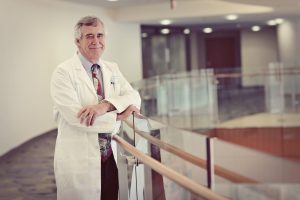
Thomas C. Shea, MD, professor emeritus, co-authored a study published in the journal Blood Advances. The study aimed to determine the optimal induction regimen for patient’s mantle cell lymphoma (MCL) receiving an autologous stem cell transplant.
There is a standard option for the initial management of transplant-eligible mantle cell lymphoma. The approach is an aggressive induction chemoimmunotherapy followed by high-dose chemotherapy and autologous stem cell transplant. However, the optimal induction regimen before the transplant procedure is unknown.
The researchers assessed the five-year outcomes of the S1106 study, a randomized phase 2 multi-institutional clinical trial comparing induction R-hyper-CVAD (rituximab plus hyperfractionated cyclophosphamide, vincristine, doxorubicin, and dexamethasone) and methotrexate/cytarabine with rituximab and bendamustine followed by autologous stem cell transplant in newly diagnosed MCL patients.
They report that the five-year follow up research showed both arms of S1106 had “excellent survival,” with 70 percent of patients alive and 60 percent were disease free. Also, the study demonstrated that an outpatient-based, less intensive induction therapy of bendamustine plus rituximab is highly effective, safe, and durable in untreated transplant-eligible mantle cell lymphoma patients.
Their findings are being used in the design of a future Eastern Cooperative Oncology Group–led trial (EA4181). This trial tests bendamustine-based induction chemotherapy with cytarabine and/or a BTK-inhibitor in untreated MCL patients.
